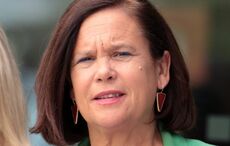In his recently published book JACK KENNEDY: ELUSIVE HERO, top MSNBC host and author Chris Matthews goes in search of President John F. Kennedy, the man who has fascinated him all his life. And on his long-running show Hardball, Matthews searches for solutions to modern-day issues. CAHIR O’DOHERTY talks to the proud Irish American about Kennedy and the current crop of politicians vying for power.
What was he like? Who did he love? Did he ever actually love anyone?
The provocative questions that MSNBC host and author Chris Matthews asks about the 35th president, John F. Kennedy, go much deeper than what he did and where he went throughout his storied career.
Matthews conjures the era and its anxieties with the authenticity of someone who lived through them and has remained fascinated by them -- and by JFK -- his entire life.
At the peak of the Cold War, Matthews reminds us in his highly accessible new book, JFK saved the United States from an impending nuclear war.
But how did he do it? What prepared him to become the leader the country needed?
Matthews’s book, Jack Kennedy: Elusive Hero (Simon & Schuster), is the result of a lifelong quest to make sense of the Irish American leader his wife Jacqueline Kennedy called “that unforgettable, elusive man.”
“I did an earlier book on Kennedy and Nixon back in 1996, and that kind of set up the scaffolding for a lot of this particular history,” Matthews, 66, told the Irish Voice during a lengthy interview this week.
“But then I really started getting this sense of responsibility about it.”
When asked why he wrote his latest book, Matthews replies there were several compelling reasons.
“The first reason,” he says, referencing the work of F. Scott Fitzgerald and the Irish impulse to commemorate fallen chieftains simultaneously, “was that like Nick Caraway in The Great Gatsby, I wanted to get people to attend the funeral but nobody would come. I felt it was my responsibility to get somebody. I didn’t want to let it fade.”
The next impulse was his fascination with the level of loyalty that Kennedy inspired in those around him, particularly men.
“What is it about the regard guys had for him I wondered? Men to men, they would follow him into the battle. The fealty to the skipper.”
Matthews pauses for a moment and adds, “Leadership is different from celebrity. It’s a statement that seems to draw a line between the past and present.”
Starting out, Matthews had a simple premise -- who is this guy? The answers he got from those who knew him were tantalizing but unsatisfactory: “He was just great. He was just wonderful. He could be cold, he could be careless, but oh he was something.”
What Matthews discovered early on was that Kennedy was a romantic individual in one sense; he was someone that myths could easily grow up around. It’s one of the reasons women loved him.
“Women lost all sense of responsibility around him. They fell before him. There was one young woman called Mimi Fahnestock who fell for him and she said what everyone else did – ‘I’d do it all again.’”
But rich as he was, even as leader of the free world, Kennedy didn’t like to be alone.
“He would have Dave Powers (his special assistant) tuck him in at night, he wouldn’t even turn out the lights. He always had to have company,” Matthews relates.
With all his wealth and tremendous social confidence, why did Kennedy find it so hard to be alone, Matthews wondered?
“Most guys can be alone. Nixon was a loner. It surprised me how much he craved company.
Perhaps it was a hangover from the Victorian atmosphere childhood. Neither of his parents were what you’d call warm,” Matthews suggested.
“He must have told Jackie Kennedy all these stories about his mom because she had them ready to go a week after he was shot,” Matthews says.
“When she was still in shock from the shooting she told journalist Theodore H. White about his aloof mother and he covered for it. Jean Kennedy Smith disagrees with that story. She called me some time later and said her mother was busy with my sister Rosemary. She didn’t agree with Jackie’s story.
“But they did send him off to Choate, one of those cold, British inspired schools. It sounds like Churchill’s biography, the way he was treated.”
It was old Joe Kennedy’s influence. His boys were sent to Protestant schools and the girls went to Catholic schools. It was all part of a larger plan for Irish Catholics to assimilate into the ruling class.
Says Matthews, “Here’s how it worked: before World War II my mom would say the milk company would ask you to fill out an application as a working girl. If you wrote Catholic you didn’t get the job. But the war changed everything.
“All the Catholics and all the Irish fought in the war. They were heroes, they won so many medals.
That changes the perceptions. But I still remember in the 1950s marching up and down Bustleton Avenue in Philadelphia with American flags in our hands.
“What was all that about? It was an attempt to assimilate, to really become American without hyphenation. We were being taught to be Americans by our Depression era, pre-war relatives. They had seen the other side of it.”
When Senator Joe McCarthy came along in 1954 he was a hero to everybody, Matthews says, in a matter of fact way.
“I don’t care what everyone says now or for all this revisionism. The Irish were all for McCarthy,” Matthews maintains.
“He was anti-Communist, he had the black Irish look, he was rough and sweaty and – to put it lightly – somewhat irresponsible.
“But he was on our side against the Communists. He was against the establishment and the elites. He was classic Irish.”
Matthews remembers coming home from school and looking at his family’s first TV set in the 1950s. The Un-American Activities hearings were on all the time, he recalls.
“My mom was rooting for McCarthy against the Communists at Harvard and Brown. McCarthy was the source of tremendous pride. The Irish stuck with him, and if you read my book it was tough as hell for the Kennedys to handle,” he says.
“McCarthy went too far. He was probably drunk most of the time, and totally irresponsible.”
When JFK came along in 1956 he was something completely new.
“He was aristocratic, he was good looking and charming, he was well mannered and intellectual but he was one of us. He could navigate between those worlds,” Matthews says.
For the Irish of the period, good government meant WASP. Irish politicians meant the old city machine, which meant corruption. JFK helped break that mold.
“He was honest as hell, rich as hell, he was a reformer that could work with the old guys too -- they loved him. He was above us too in a way,” Matthews feels.
And what about his elusive subject? Did he love anybody? Who truly knew him?
“It’s such an interesting question,” Matthews says. “Who did he ever fall for in life? I think he fell for Inga Arvard, the former Miss Denmark, who was a total sexpot, a Scandinavian dream girl.
“I also always thought he was nuts over Mary Meyer (the American socialite, painter and former wife of the CIA official Cord Meyer). She didn’t play up to him but she was a hot ticket, she was fun and aristocratic. I think he liked her the most. He always wanted to be around her when he was really feeling terrible.
“And I always want to know who the guy loves. It reveals him. My hunch is it was her.”
Jackie Kennedy was aristocratic and had the polish that JFK craved. In his own narcissistic way, it was what he wanted to look like, Matthews believes.
“He wanted to be standing next to her. He was focused on the right shoes, the right haircut, he had his head massaged to prevent baldness, and he wanted to look good,” says Matthews.
“He was always mystified how Jackie would rise to the occasion, she would always perform better than he could imagine. The way she looked in Paris, the way she looked in Texas in that last week, she could turn on a crowd with Spanish, French. He loved the that regal part of her. There’s no doubt about it.”
What do the Irish care about more than food and sex and booze? Status, we’re all about status, Matthews contends, and he believes that JFK was no different.
“Where do you stand in the scheme of things? What seat do you have, where are you in the room? That’s what we obsess about,” he says.
Going to the mat over status was the theme of another U.S. presidential campaign over the weekend, when HBO broadcast Game Change, the film that focuses on the fall of Senator John McCain’s fortunes and the rise of Sarah Palin’s during the 2008 presidential campaign.
“I saw it three times over the weekend,” Matthews confesses. “You think I’m crazy? I saw it three times all the way through and I thought that Woody Harrelson was spectacular. He stole that film.”
In Game Change Harrelson, playing McCain’s political director Steve Schmidt, confesses that McCain can’t stop watching MSNBC, even though it’s become obvious they’re rooting for Obama.
“Poor John. I feel so bad about that. That got to me,” Matthews confesses.
“We celebrated John all though his first run against Bush because he was such a better man. We rooted for him like mad in that first race in 2000 and we got blown away. And then Obama came along and grabbed us all.
“So I’m at the Al Smith dinner in 2008 at the Waldorf and McCain comes out and gives one of the best speeches I’ve ever heard in my life. It was a barnstormer.
“Then he says, ‘Chris Matthews used to like me.’ Then he lists my table number way in the back and he says, “I guess Chris just doesn’t like me anymore. I can do maverick, I just can’t do messiah.’
“It was brutal and so funny. Then I watched that movie and he’s watching MSNBC tear into him and root for Obama and I think he must think he’s been turned on. I think he’s still ticked at us all.
“I could write him a note but I don’t think he’d read it. It’s just the way politics is. He lost the media. He lost us all.”
Asked about Julianne Moore’s portrayal of Palin Matthews replies, “I thought it was a faithful portrait. I’ve gotten to trust Steve Schmidt (the man who suggested Palin as a vice presidential pick).
“You find yourself in a situation and then you have to defend the situation completely. Here he is defending the decision to pick her and also have to win the campaign, make her useful to win the campaign and also just keep her on board.”
Moore nailed the character, he feels. “The windshield wiper wave and the tremendous force on stage. I think 90% of Palin is stage ability. The way she commands a stage is fabulous,” McCain says.
“You can’t do that sitting in a little broadcast booth in Wasilla. Her career has not been helped by that tremendous familiarity with her on Fox. The magic is lost if all she is ever doing is sitting in that booth.”
Despite the seemingly endless political gaffes made by the current GOP presidential field, Matthews believes that everything is still in play.
“My view of politics is honed down to this. It’s binary; it’s one or zero. It’s also baseball,” he says.
“The voter is a baseball manager who watches the field. If the thinks the pitcher on the mound has still got it, if he’s getting them out, then he’ll keep him in. If he doesn’t think he has control of the game he walks out, puts his right hand out and takes the ball from the guy.
“That’s the process. If you understand that you understand politics. It’s, ‘How’s he doing out there?’ Obama has to get control of this game by late summer.”
That’s why the Republicans, with all their primary season ups and downs, have a 50/50 chance of winning in November, Matthews says. In the end it will all come down to Obama’s performance on the economy.
Meanwhile, the enduring Irish fascination with JFK must be shared by African Americans when it comes to Obama, he agrees.
“I recall how proud we all were of Kennedy, and I can only imagine how proud black people are of
Obama. To know your kid growing up, when they take them down to Independence Hall and they show them those old guys, kids have a totally different view of that now,” says Matthews.
“Before it was just the same white guy from 1776 to 2008. Now the boss is black. It’s just different. It’s got to have an impact on kids with ambition. It’s a totally different world.”
The lesson that Kennedy left us with is the importance of public service. Running for office should still be an aspiration for the brightest and best among us.
“I think we had a hero for a president. The courage he had in war when he dived into the water with gasoline burning all around him, saving the life of Paddy McMahon, is the same guy that got us through the Cuban missile crisis.”
Kennedy was willing to learn the business of politics. If young people today are not encouraged to do likewise we will have a real problem -- we will have the dregs running the country, Matthews concludes.
“We have to encourage young people like Bill Clinton and Jack Kennedy to be ambitious in politics. The sadness of this campaign season is the weakness of the Republican field,” Matthews feels.
“This group of replacements we’re looking at. They’re not leaders of today. They’re just used-to-be’s. People have seen how dangerous and unrewarding politics can be today. It’s narrowed it down to people with money, or extremists. We have a deficiency of ambition. We have too few Bill Clintons.”
Matthews is remarkable among commentators in the sense that he can dispassionately evaluate the candidate he’s looking at, a vanishing skill on the nightly news.
“I get along with Rick Santorum and I like him when I see him even though the things he says areoutrageous,” he says.
“I get along with Newt Gingrich because we both have a background in the House of
Representatives. And Romney is a man of business.”
Matthews suddenly laughs uproariously at the image that has come into his head.
“He reminds me of one of those guys in A Christmas Carol. The way that Romney presents himself is so 1950s. I do notice they seem to be a different vintage. They just come from a different direction to most of us now.”
In his own way Matthews has remained as elusive as his famous subject. Predicting his outlook or his private opinions is an impossible task.
It’s the key to his success as a commentator, and it’s what makes his study of Kennedy such a compelling read.




Comments